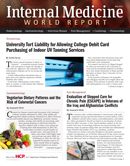Publication
Article
Internal Medicine World Report
Overuse of Antibiotics in Primary Health Care: Patient Education Crucial, Too
Author(s):
A recent Chinese study of antibiotic use in primary care settings found that up to 93% of respiratory tract infections (RTIs) were treated with antibiotics, with more than 60% reported as inappropriate.

A recent Chinese study of antibiotic use in primary care settings found that up to 93% of respiratory tract infections (RTIs) were treated with antibiotics, with more than 60% reported as inappropriate. The study, by Wang et al in JAMA Internal Medicine, found inadequate education and training of primary health care personnel was a key problem.
In a recent letter to JAMA Internal Medicine, Emmanouil K. Symvoulakis, MD, PhD, and colleagues responded to the Wang et al study, asserting that holistic and interdisciplinary approach to patient education is just as crucial. They noted that Greece is among the countries with the highest antibiotic consumption and antimicrobial resistance rates in Europe.
In Greece, access to antibiotics may be offered directly from pharmacists without medical prescription, with the exception of fluoroquinolones and third-generation cephalosporins, and thus antibiotic misuse is widespread and underreported.
“Inappropriate antibiotic prescription writing should be approached as a multifactorial problem where social norms play an important role,” Symvoulakis stated. Primary care physicians often encounter nonspecific RTIs at an early stage; when faced with diagnostic uncertainty and potential complications—as well as “ill-founded” patients’ demands and expectations—and physicians may adopt a defensive approach and prescribe antibiotics to ease fears despite the absence of evidence-based need.
Clients view a prescription as a “substantial” and “tangible” consultation outcome, he said, adding value to the physician-patient encounter. Therefore, patient-induced antibiotic prescribing is an essential area of intervention if this problem is to be fully addressed.
Education about antibiotic resistance and proper use of antimicrobials must be started at the undergraduate level for all health care providers and must target patients as well as practitioners, Symvoulakis concluded. Culturally sensitive public health campaigns are needed to help laypeople recognize that antibiotic resistance is a serious problem for the individual patient as well as the entire nation.






